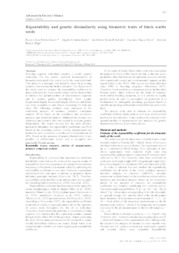Repeatability and genetic dissimilarity using biometric traits of black wattle seeds.
Repeatability and genetic dissimilarity using biometric traits of black wattle seeds.
Author(s): SCHUHLI, G. S. e
Summary: Selecting superior individuals requires a careful genetic evaluation. For this reason, repeated measurements of biometric traits need to be carried out in the same individual. This index is a strategic tool aimed to assist in providing accurate observations and further selection. The objectives of this study were to estimate the repeatability coefficient in many seed traits for black wattle clones; test the best method to estimate the optimal number of measurements required; and to analyze genetic dissimilarity. Seed weight, longitudinal length, transversal length, thickness and hilum size were evaluated in nine clones measuring 50 seeds per clone The following methods were employed in the evaluation: analysis of variance, principal component analysis (PCA) based on the correlation and covariance matrices, and structural analysis. Mahalanobis distance was calculated and a scatter plot was created to evaluate genetic dissimilarity. The results showed that the most effective method to determine the repeatability coefficient was PCA based on the covariance matrix. Twenty measurements are needed in order to achieve a coefficient of determination of 90%. Based on the measures of genetic dissimilarity, it was possible to differentiate clones and to recognize two genetically distinct groups.
Publication year: 2018
Types of publication: Journal article
Unit: Embrapa Forestry
Observation
Some of Embrapa's publications are published as ePub files. To read them, use or download one of the following free software options to your computer or mobile device. Android: Google Play Books; IOS: iBooks; Windows and Linux: Calibre.
Access other publications
Access the Agricultural Research Database (BDPA) to consult Embrapa's full library collection and records.
Visit Embrapa Bookstore to purchase books and other publications sold by Embrapa.

